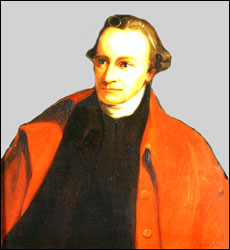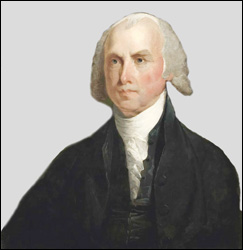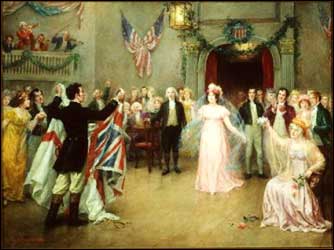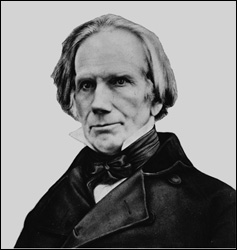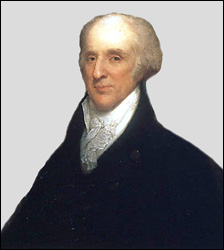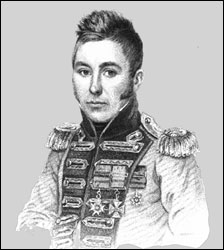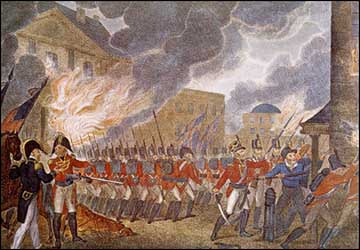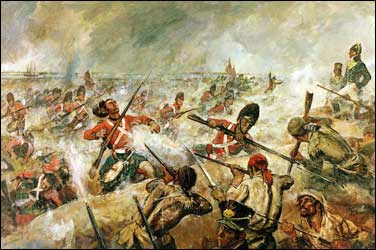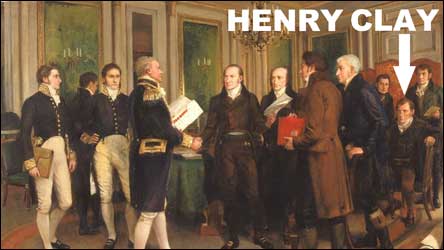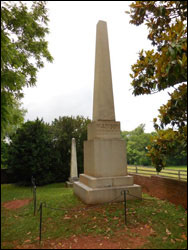JAMES MADISON IS KNOWN AS THE "FATHER OF THE U.S. CONSTITUTION." "HIS MADNESS" REIGNED AS PRESIDENT FROM 1809 to 1817. MADISON SUFFERED FROM THE "FALLING SICKNESS" OR EPILEPSY. 2 OTHER NOTORIOUS PERSONAGES EXHIBITED THE SAME SYMPTOMS: JULIUS CAESAR AND MUHAMMAD. THE HOLY BIBLE CALLS IT DEMONIC POSSESSION!! |
During the ministry of the Messiah the "falling sickness" or epilepsy was clearly recognized as demonic possession:
News about him (Messiah) spread all over Syria, and people brought to him all who were ill with various diseases, those suffering severe pain, the demon-possessed, those having seizures, and the paralyzed; and he healed them all (Saint Matthew 4:24).
Like Muhammad, Madison's seizures began when he was in infant:
On Madison's illness upon leaving Princeton, Irving Brant argues cogently the young scholar suffered from a functional ailment modern medicine calls epileptoid hysteria. Madison himself described the disease as "a constitutional liability to sudden attacks somewhat resembling Epilepsy, and suspending the intellectual functions. They continued tho' (my) life, with prolonged intervals." Among the papers of Madison's father is a list of drugs "for an Epilepsy" dated October 11, 1753. (Ketcham, James Madison: A Biography, pp. 51-52).
An anguished father brought his epileptic son to the Messiah for healing and he was cured as soon as the demon was cast out:
When they came to the crowd, a man approached Joshua and knelt before him. "Teacher, have mercy on my son,” he said. “He has seizures and is suffering greatly. He often falls into the fire or into the water. I brought him to your disciples, but they could not heal him. "You unbelieving and perverse generation,” Joshua replied, “how long shall I stay with you? How long shall I put up with you? Bring the boy here to me.” Joshua rebuked the demon, and it came out of the boy, and he was healed at that moment. (Saint Matthew 17: 14-18, Saint Mark 9:17-29).
Instead of turning to the Great Physician for deliverance from the demons, Madison's faithless and unbelieving father turned to medicine....If some genuine Christians had prayed over baby Muhammad in the name of Joshua of Nazareth and cast out the demon . . . Islam would not exist to deceive the troubled world today!
. |
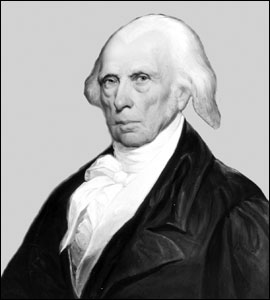 James Madison (1751–1836) was a Congressman, Senator, and President for 8 years. Madison and the people close to him did not believe in demonic possession, so he went to his grave believing that his "epileptic seizures" were the result of "natural causes!" His face was too ugly for the "Infernal" Reserve Bank to place his portrait on their paper money! |
Close friend Thomas Jefferson witnessed Madison's frequent "epileptic seizures, " but he denied the miracles of Christ (including the Resurrection), so he attributed demonic possession to "natural causes." The "Jefferson Bible" removed all the miracles in the New Covenant because Jefferson believed they were myths and fables!
|
Most of the delegates believed that they were meeting to amend the Articles of Confederation and Perpetual Union, but that great patriot Patrick Henry "smelled a rat" beforehand and refused to attend!
|
The Senate was modeled after the House of Lords in London and Madison knew that he would block any Bill of Rights by bribing the newly appointed Senators. Henry foiled him in that attempt so he had to run for a seat in Congress from Virginia.
|
Originally, 25 amendments were proposed to take the "sting" out of the "Constitution." but Madison reduced the final number to 10.
Madison served as Secretary of State under Thomas Jefferson from March 4, 1801 to March 4, 1809. Back then the position of Secretary of State was stepping stone into the White House. Jefferson witnessed Madison's epileptic seizures, but he completely rejected demonic possession, and attributed his bizarre behavior to "natural causes."
|
Just 3 years into his reign, Madison invited the Jacobites to return and set up their "Holy Roman" Empire States of America, Inc. The man that he used was a Jacobite on steroids from Kentucky named Henry Clay.
Kentucky "Dark and Bloody Ground" was originally part of Virginia and stretched to the mighty Mississippi River. Once Kentucky obtained independence from Virginia in 1792, the settlers conspired with "Agent 13" General James Wilkinson to become part of the Spanish Empire!
Henry Clay was as wicked as Haman, King Herod, and Emperor Nero....That proves that New World demons are as wicked as their Old World counterparts. Henry's burning ambition was to be President, and no "corrupt bargain" was beneath him to obtain his objective!
|
Kentucky was already notorious for duels. The future President Jackson was almost killed in a duel in Logan County, Kentucky. Even in the 21st century elected officials in Kentucky have to swear (or affirm) that they will not take part in a duel!
|
5 of Mary Todd Lincoln's brothers fought for the Confederacy. One brother named David was commandant of the infamous Libby Prisoner of war camp in Richmond, Virginia.
|
Throughout the country the Jacobites rejoiced greatly at the news of the death of the prime minister....Many in London feared that the deadly Lord George Gordon Riots of 1780 were about to be repeated!
The House of Representatives voted for a declaration of war on June 4, and 2 weeks later the Senate followed. Madison signed the declaration on July 18, 1812.
|
All was chaos after the Jacobites burned the capital and Madison had another of his epileptic fits....James Monroe kept his head but he had no idea that the attack on Washington City was just a faint while the real target was New Orleans!
After the burning and sacking of the capital, Armstrong was forced to resign in disgrace, and Jefferson replaced him with his Secretary of State named James Monroe...That was the same James Monroe who was challenged to a duel by Alexander Hamilton over the Hamilton-Reynolds affair.
|
"Bulldog" Burgoyne survived the battle and he went on to be the official advisor to Lord Raglan during the First Crimean War.
|
During the Jacobite rampage, a tornado touched down and put the fear of God into the soldiers. They certainly had nothing to fear from the militia as they returned to their ships for the conquest of New Orleans.
General Jackson knew that he could not trust any of the politicians in Washington City, so he acted on his own initiative and secured Florida from a British invasion. Then he captured the Spanish fort at Mobile, Alabama. Loss of the port at Mobile meant that the armada could not land there and travel overland to New Orleans in order to attack the city from the north!
|
Incredibly, in January 1814, Madison sent Henry Clay over to Ghent in Belgium as a "peace commissioner" with John Quincy Adams.
Clay stepped down from the Speakership and resigned from Congress on January 19. As South Carolina War Hawk Langdon Cheves took his place, the House voted 144 to 9 to commend Clay for his Service as Speaker. He arranged for Lucretia and the children to return to Ashland, received his instruction from Secretary of State James Monroe, and headed for New York to join Russell and set out for Sweden. Clay was confident that everything would be settled in months (Heidler, Henry Clay: the Essential American, p. 108).
Clay was indeed supremely confident that New Orleans would be conquered by his Jacobites in a few months!
|
After signing the "peace treaty" at Ghent, Clay planned on leaving for London, but before he left he heard the news from New Orleans:
In view of the many military defeats suffered by his country, Clay did not relish the idea of leaving this congenial city and journeying to London to conclude a treaty of commerce. But around the middle of March 1815 Clay received word of General Jackson's tremendous victory over the British at New Orleans on January 8, 1815, in which approximately two thousands British soldiers were killed, wounded, or captured. The commanding general of the British army, Sir Edward Pakenham, was also killed, along with many of his senior line officers. Prince Hal was jubilant. "Now" he reportedly said, "I can go to England without mortification." The only unpleasant aspect of this military victory was the cowardice supposedly demonstrated by the Kentucky militia on the west bank of the Mississippi River, where they were routed by a British force commanded by Lieutenant Colonel William Thornton. "I am mortified" wrote Clay, particularly since Jackson claimed that Thornton's troops would have been captured had the Kentuckians not fled the scene. (Remini, Henry Clay: Statesman for the Union, pp. 125-126).
From that time onward, Clay became a bitter enemy of General Jackson. He was afraid to challenge the general to a duel so he expected to exact his revenge once he reached the White House!
The Presidential election of 1824 went to the House of Representatives where Clay was once again Speaker. In the "Corrupt Bargain," he gave the Presidency to John Quincy Adams, with the stipulation that Adams would appoint him Secretary of State. Clay was fully confident that he would succeed Adams in the White House.
No matter who hard Clay tried to reach the White House our Great JEHOVAH foiled his every attempt:
Then the iron, the clay, the bronze, the silver, and the gold were broken to pieces together, and became like chaff from the summer threshing floors; the wind carried them away so that no trace of them was found. And the stone that struck the image became a great mountain and filled the whole earth. (Daniel 2:35).
Clay was campaigning for the Presidency until the very day of his death on June 29, 1852.
|
In the Gospel accounts the disciples could not cast out the wicked spirit so they asked the Messiah why they could not cast him out. He replied:
When Joshua saw that the people came running together, he rebuked the unclean spirit, saying unto him, “deaf and dumb spirit, I command you, come out of him and enter him no more!” Then the spirit cried out, convulsed him greatly, and came out of him. And he became as one dead, so that many said, “He is dead.” But Joshua took him by the hand and lifted him up, and he arose. And when He had come into the house, his disciples asked him privately, “why could we not cast him out?” So he said to them, “This kind can come out by nothing but by prayer and fasting.” (Saint Mark 9:25-29).
As we approach Armageddon and the end of the world there will be a great increase in demonic possession (Apocalypse 20:7). Thankfully, Satan or Apollyon can once again be defeated by the tried and proved method of praying and fasting (Esther 4:16, Daniel 10:2-2).
Vital links
References
Brant, Irving. The Fourth President. A Life of James Madison. Easton Press, Norwalk, Connecticut, 1986.
Brands, H.W. Andrew Jackson, His Life and Times. Doubleday & Company, New York, 2005.
Cheney, Lynee. James Madison: A Life Reconsidered. Viking Press, New York, 2014. (Former Vice President Cheney's PH.D in History spouse).
Drez, Ronald J. The War of 1812: Conflict and Deception. The British Attempt to Seize New Orleans and Nullify the Louisiana Purchase. Louisiana State University Press, Baton Rouge, LA, 2014.
Heidler, David S. & Jeanne T. Henry Clay: The Essential American. W.W. Norton & Company, New York, 1991.
Hibbert, Christopher. King Mob: The London Riots of 1780. Dorset Press, New York, 1958.
Ketcham. Ralph. James Madison: A Biography. University Press of Virginia. Charlottesville, VA, 1990.
King, Quentin Scott. Henry Clay and the War of 1812. McFarland & Company, Jefferson, North Carolina, 2014.
Linklater, Andro. Why Spencer Perceval Had to Die: The Assassination of a British Prime Minister. Walker & Company, New York, 2012.
Mayer, Henry. A Son of Thunder: Patrick Henry and the American Republic. Grove Press, New York, 1991.
Muir, William. The Life of Muhammad. John Grant, Edinburgh, Scotland, 1912. (Reprinted by Elibron Classics in 2 volumes in 2005).
Remini, Robert V. Henry Clay: Statesmen for the Union. W.W. Norton & Company, New York, 1991.
Watson, Henry L. Andrew Jackson vs. Henry Clay: Democracy and Development in Antebellum America. St. Martin's Press, Boston, 1998.
Wrottesley, George. Life and Correspondence of Field Marshal Sir John Burgoyne. Richard Bentley & Sons, London, 1871.
Copyright © 2022 by Patrick Scrivener

